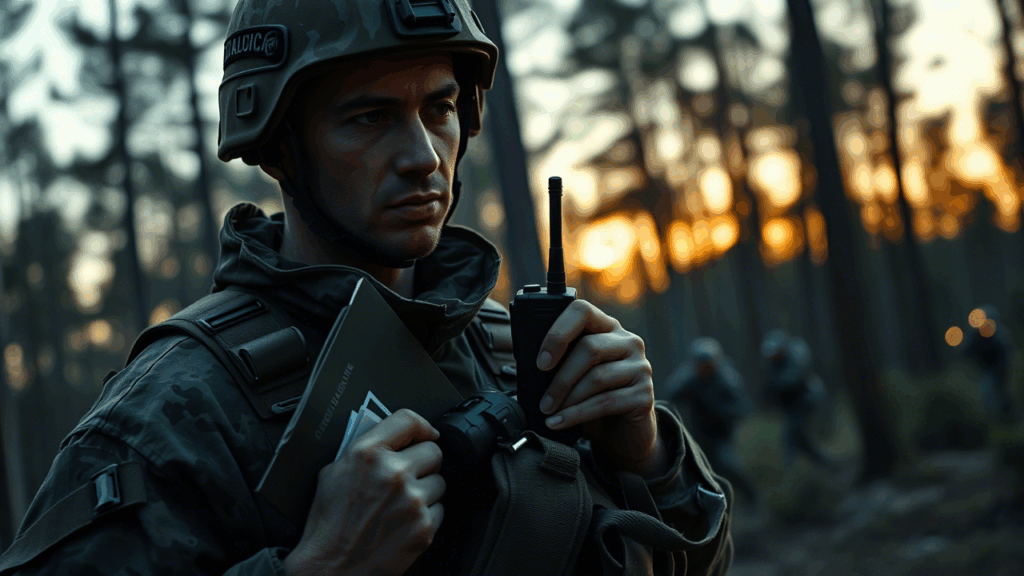Imagine the chaos. You’re in a hostile environment. You’ve evaded as long as possible, but the window is closing fast. Maybe it’s footsteps drawing closer. Maybe it’s the drone overhead that hasn’t stopped buzzing. Either way, capture isn’t just a possibility anymore—it’s imminent.
Now what?
This moment—those final, critical seconds before capture—can mean the difference between giving away valuable information and giving yourself a fighting chance. Whether you’re a service member preparing through SERE training (Survival, Evasion, Resistance, and Escape) or simply curious about how the military prepares for the unimaginable, understanding the actions to take when capture is imminent isn’t just about survival—it’s about strategy, psychology, and resolve.
Let’s break it down.
Why These Moments Matter More Than You Think
Before diving into the checklist, it’s important to understand why these actions even matter. When capture is inevitable, every second and every move can affect:
- How long it takes for friendly forces to locate you
- Whether sensitive information falls into enemy hands
- Your psychological readiness to endure captivity
- The chances of an eventual escape or rescue
Military personnel train for this exact situation through SERE—training that’s often grueling, but designed to prepare them mentally and tactically. That training hinges on one key truth: You may not control being captured, but you can control how it happens.
Biography Table for Keyword: “actions to take when capture is imminent include”
| Field | Details |
|---|---|
| Keyword | actions to take when capture is imminent include |
| Search Intent | Informational – users are seeking survival or military protocol steps during an imminent capture scenario. |
| Topic Category | Military Training, Survival, SERE (Survival, Evasion, Resistance, and Escape) |
| Associated Training | SERE Level A, Code of Conduct (U.S. Military) |
| Common Platforms Ranking | Quizlet, Chegg, Brainly, Air Force Hub, Quizgecko |
| Top Search Format | Flashcards, quizzes, direct list-based answers |
| Key Actions Listed | Sanitize materials, retain phone (if safe), leave evidence, communicate, remain calm, assess situation, plan evasion, maintain low profile |
| Long-Tail Variations | – what to do when capture is imminent – SERE actions before capture – best actions when enemy capture is near |
| Relevance | High relevance to military personnel, survival instructors, security professionals, and students of military protocols |
| User Pain Point | Not knowing what to do when facing imminent capture; needing actionable steps fast |
| Tone Used in Blog | Conversational, informative, calm, slightly urgent |
| Statistical Data | No public statistics due to classified nature; mostly theoretical or SERE-based guidance |
| SEO Difficulty | Low to Medium — niche military keyword with specific audience |
| Content Gap | Lack of human-like, narrative-style content (most are flashcards or quizzes) |
| Current Top Ranking Style | Short-form, bullet points, listicles |

The Crucial Actions to Take When Capture Is Imminent Include…
1. Sanitize Sensitive Materials Immediately
You don’t want your captors to find a roadmap to your entire operation. That’s why sanitizing—or destroying—anything that could give them an edge is step one.
This means:
- Burning or burying maps, notes, or classified documents
- Wiping or smashing digital devices
- Destroying codebooks, GPS units, or comms equipment
Even personal items like photos or journals can be twisted to manipulate or extract information. If it can be used, it needs to be neutralized.
Real talk: This action might be emotional—destroying photos or letters from loved ones isn’t easy—but the bigger mission is at stake.
2. Try to Retain Your Personal Cell Phone (If Safe)
Wait, what? Isn’t that a liability?
Yes—and no. If you can hide it safely, keeping your phone may allow you to:
- Ping GPS location
- Text out a last known position
- Record your environment for evidence
- Provide future intel
But—and this is huge—it must be done without escalating the situation. If found, it could endanger you or others. It’s a calculated risk, not a default action.
3. Leave Clear Evidence of Your Presence
Even when you can’t speak, you can leave a trail.
If possible, mark the spot of your capture to assist rescue teams later. This could be:
- Scratched initials on a tree
- An overturned item
- A note tucked in a waterproof bag
SERE training emphasizes this because it tells your team: “I was here. This is where it started.” Those clues can jumpstart search and rescue operations.
4. Communicate Quickly—If You Can
Got even a moment to send a message? Use it.
That could be:
- A short text
- A coded message over radio
- A GPS drop
Even a simple “CPT imminent. Sanitized. Grid: 23QXY876345” gives your team a huge head start.
Of course, this depends on your environment and whether it’s even possible. But if it is, don’t waste the chance.
5. Remain Calm (Even When It Feels Impossible)
Easier said than done, right? But there’s power in composure.
Panic is the enemy in these situations. It clouds judgment, leads to careless mistakes, and makes you more vulnerable. A calm mindset helps you:
- Think rationally
- Observe your captors
- Retain control over your reactions
This is where mental conditioning from SERE truly shines. Service members train under simulated capture to practice staying level-headed, no matter how intense it gets.

6. Quickly Assess the Situation
Don’t just shut down mentally. Instead, observe and analyze:
- How many captors are there?
- Are they armed? Alert? Aggressive?
- Is there a route to evade?
- Are you in earshot of others?
This moment of assessment might reveal an opening—or at least inform your next move.
7. Plan for Evasion (If Viable)
If there’s even a small chance to escape before the situation fully locks down, take it.
But—and this is key—only if it doesn’t increase the danger significantly.
This is not about heroics. It’s about odds. If slipping away is possible and smart, you go. If it’s a suicide move? You stay still. SERE principles guide evasion with discipline, not desperation.
8. Keep a Low Profile
Once capture is unavoidable, don’t antagonize your captors. This isn’t the moment for bravado. Instead:
- Be compliant without being submissive
- Don’t volunteer unnecessary information
- Avoid eye contact if it might escalate things
- Stay physically relaxed to avoid triggering aggression
A calm, non-threatening demeanor can reduce your captors’ perceived threat level and might influence how you’re treated.
The Code of Conduct Behind the Actions
These actions aren’t random. They stem from the U.S. Military Code of Conduct, a framework guiding how service members behave when facing capture.
One key principle: “I will evade capture if possible. I will not surrender of my own free will.”
But if capture is imminent, your actions shift toward minimizing enemy advantage and protecting your fellow service members. This includes:
- Not giving up critical intel
- Leaving clues for rescue
- Mentally preparing for resistance
Why This Matters—Even If You’re Not Military
You may not be in combat, but the mindset of SERE training—resilience, awareness, calm under pressure—has real-world parallels:
- In hostage situations
- During natural disasters
- In cases of abduction or civil unrest
Knowing what to do when you lose control of the situation can be the most powerful form of control you have left.
Remember This If Nothing Else…
The actions to take when capture is imminent include more than tactics—they include mental grit, strategic awareness, and a commitment to survive with honor.
It’s about holding on to your identity, your purpose, and your responsibility to those who might still be coming for you.

Final Thoughts
This isn’t just some checklist buried in a flashcard on Quizlet or a quick answer on Chegg. It’s a distilled survival strategy taught through hard-won experience in the world’s most elite military training programs.
Whether you’re a service member, a survivalist, or someone who just wants to understand how people prepare for the worst, knowing what to do in those last moments before capture can change everything.
Stay sharp. Stay ready. Even when capture is imminent—you’re not powerless.
